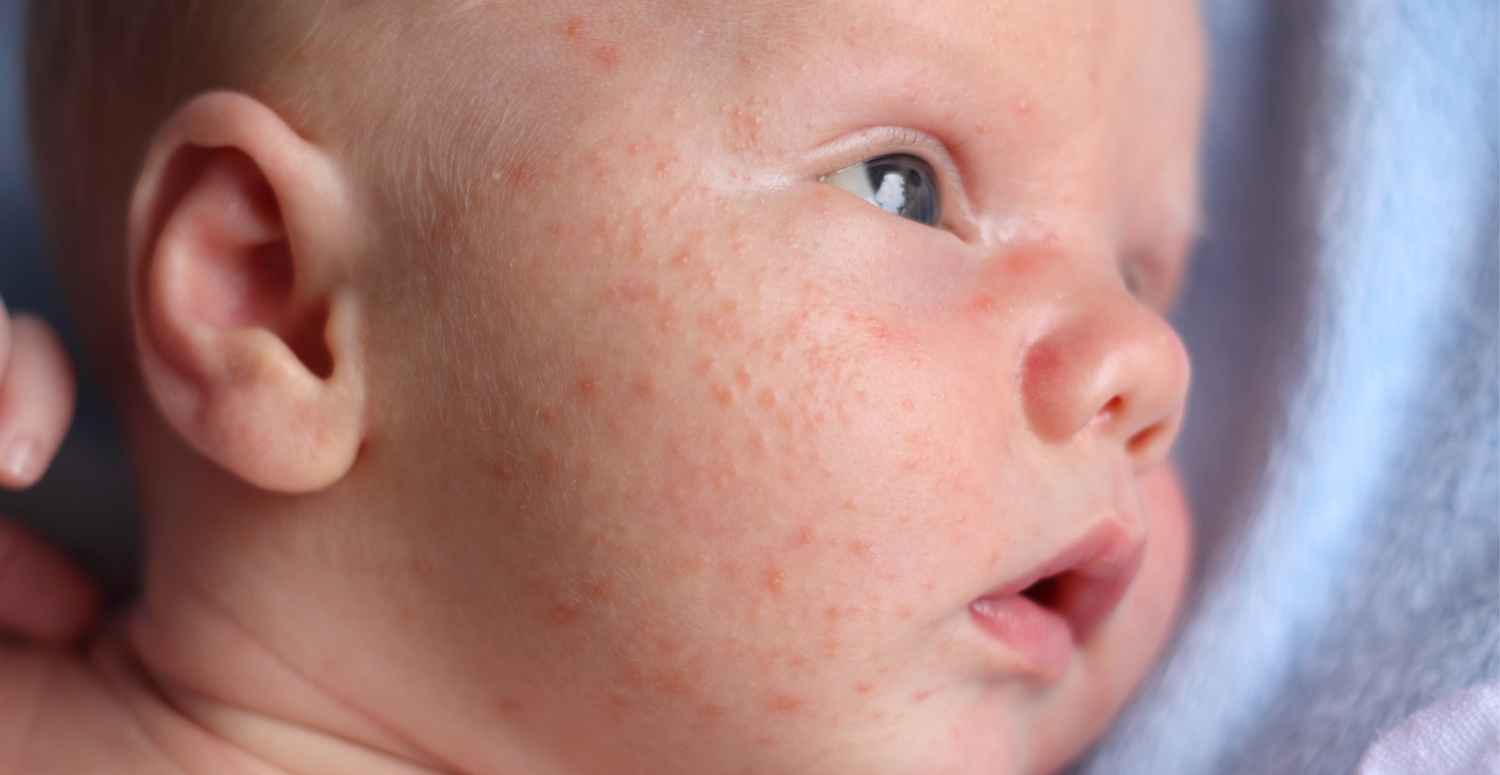Baby acne is a skin condition that affects a large number of newborns and infants. It usually manifests itself as small, red or white bumps on a baby's face, particularly on the cheeks, forehead, and chin. While baby acne can be upsetting for parents, it is generally a harmless condition that does not harm a baby's skin in the long run. To treat baby acne, parents can gently wash their baby's face once a day with warm water and mild soap, taking care not to scrub or irritate the skin. It is also critical to keep a baby's face dry and to avoid using harsh or oily products that may aggravate acne. In some cases, a doctor may recommend a topical medication or cream to help clear up the acne more quickly.
Understanding Baby Acne
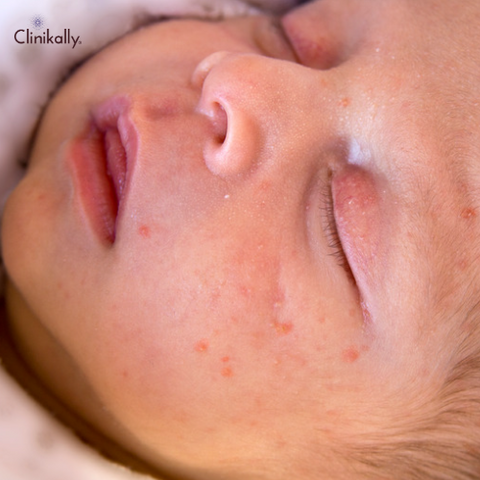
Baby acne is a common, short-term skin condition characterized by acne breakouts on your baby's face or chest. Baby acne symptoms include pimples, small bumps, or pustules on your baby's skin, just like adult acne. Baby acne typically appears within the first few weeks after birth and can last for several months. It is most commonly seen in infants between the ages of two and four weeks, but it can also develop later on.
What is Baby Acne?
Baby acne is a skin condition that affects a large number of newborns and infants. It can be identified by tiny, red or white bumps that frequently appear on the cheeks, forehead, and chin of the infant. While seeing their baby's face covered in bumps can be frightening for parents, baby acne is usually harmless and goes away on its own without treatment. The precise cause of baby acne is unknown, but it is thought to be related to hormonal changes in the mother during pregnancy. These hormones can stimulate the baby's oil glands, resulting in acne. Additionally, some infants might be more sensitive to specific irritants or foods, which can hasten the development of acne.
Baby acne usually appears in the first few weeks of life and can last for months. It is critical to note that baby acne is not the result of poor hygiene or allergic reactions. In fact, over-washing your baby's face or using harsh soaps or lotions can aggravate the acne.
There are a few things you can do to help manage baby acne, though most cases will go away on their own in a few months:
-
Once every day, gently wash your baby's face with warm water and a mild soap or cleanser.
-
On your baby's face, stay away from lotions and oils.
-
Avoid attempting to squeeze or pop the pimples because doing so can lead to infection and scarring.
-
Consult your paediatrician if the acne is severe or does not go away after a few months. They might suggest a topical medication.
Types of Baby Acne
The two primary types of acne in infants are neonatal acne and infantile acne.
-
Neonatal acne: Up to 20% of newborns experience this type of baby acne, which typically appears within the first two months of life. Small, red or white bumps on the baby's face, particularly on the cheeks, nose, and forehead, are its defining feature. Neonatal acne is thought to be brought on by hormones the mother's body produced during pregnancy. The majority of the time, neonatal acne clears up on its own within a few weeks or months and does not need to be treated.
-
Infantile acne: About 1% of newborns experience this type of baby acne, which typically appears between three and six months of age. Neonatal acne is less severe than infantile acne, which can result in larger, more inflammatory bumps that could be pus-filled. Along with the face, the chest and back can also be affected. Infantile acne, as opposed to neonatal acne, may need to be treated with oral or topical medications that are prescribed by a paediatrician or dermatologist. Even though infantile acne can last for months or even years, it usually goes away on its own by the time a child is two or three.
How Common is Baby Acne?
Baby acne is a fairly common condition that affects a large number of newborns and infants. Up to 20% of newborns are expected to develop some form of baby acne within the first few weeks of life. Baby acne can affect both sexes, though it is more common in boys than in girls. Most cases of baby acne are minor and don't require treatment, but occasionally the acne is severe and persistent and needs to be treated by a doctor. Infantile acne, which affects older infants between the ages of three and six months, can be more severe and persistent even though it is less common than neonatal acne.
What Causes Baby Acne?
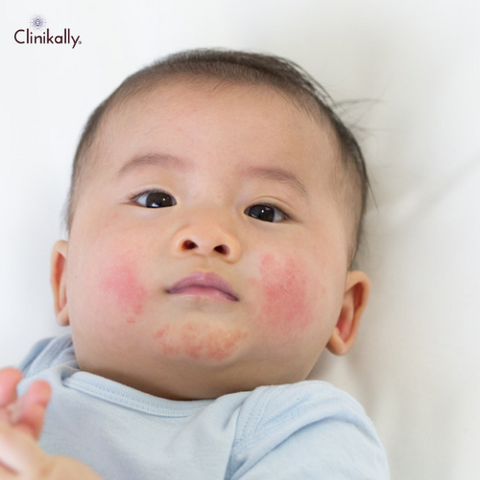
The precise cause of baby acne is unknown, but it is thought to be related to hormonal changes that occur during pregnancy and after birth. Some of the factors that may contribute to the development of baby acne include:
-
Hormones: The mother's body produces large amounts of androgens, which can cross the placenta and have an impact on the unborn child's developing skin. After birth, the baby's body produces its own hormones, which can stimulate the oil glands and lead to the development of acne.
-
Skin immaturity: A new-born's skin is delicate and immature, making it potentially more susceptible to irritants or other elements that can encourage the growth of acne.
-
Family history: Baby acne may run in families, indicating that the condition may have a genetic basis.
-
Bacteria: Skin-dwelling bacteria like Propionibacterium acnes may also contribute to the emergence of acne.
-
Irritants: Skin irritation from exposure to irritants like saliva, milk, or fabrics can also cause acne to appear.
#1 Maternal Hormones and Sebum Production
The mother's body produces a lot of hormones during pregnancy, including androgens, estrogen, and progesterone. These hormones have an effect on the developing foetus's skin and can cross the placenta. The hormones of the mother may stimulate the baby's oil glands, which could lead to an increase in sebum production and the emergence of baby acne. The sebaceous glands in the skin produce sebum, an oily substance. Sebum helps to lubricate and protect the skin, but excessive sebum production can clog hair follicles and lead to the development of acne. The effects of maternal hormones on the baby's skin are most noticeable during the first few months of life, when neonatal acne is most common. Following this time, the baby's hormone levels begin to normalize, and the acne usually clears up on its own.
#2 Skin Inflammation and Bacterial Infection
Skin inflammation happens when the skin becomes irritated and red as a result of being exposed to irritants or other factors. Inflammation can make the skin more sensitive, making it more susceptible to acne. Bacterial infection, on the other hand, can contribute to the development of acne. Skin bacteria called Propionibacterium acnes can multiply in blocked pores and hair follicles, resulting in inflammation and the emergence of acne. In some cases, baby acne can spread to other parts of the body, inflaming and hurting the skin. If you suspect that your baby's acne is infected, see your paediatrician, who may prescribe antibiotics or other treatments to clear the infection.
#3 Allergies, Eczema, and Diaper Rash
Other skin conditions that can affect infants include allergies, eczema, and diaper rash. These conditions can be confused with or coexist with baby acne. Here's how they differ:
-
Allergies: Skin allergies can develop in infants to a variety of substances, including food, clothing, and skincare products. Allergic reactions can result in red, itchy, and inflamed skin that looks like baby acne. Allergies, on the other hand, can affect any part of the body, unlike baby acne, which typically appears on the face. A healthy baby skincare routine will greatly help.
-
Eczema: Eczema is a chronic inflammatory skin condition characterized by itchy, red, and scaly patches. Eczema can appear in infants as young as two to six months old, and it frequently affects the face, scalp, and neck. Eczema and baby acne can coexist, and the treatments for each condition may differ.
-
Diaper rash: Diaper rash is a common condition that occurs when the skin becomes irritated as a result of prolonged exposure to urine or stool. Diaper rash can cause red, tender, and inflamed skin in the diaper area, mimicking baby acne. Diaper rash, on the other hand, is typically limited to the buttocks, thighs, and genital area, as opposed to baby acne, which appears on the face.
Identifying When Baby Acne is a Problem
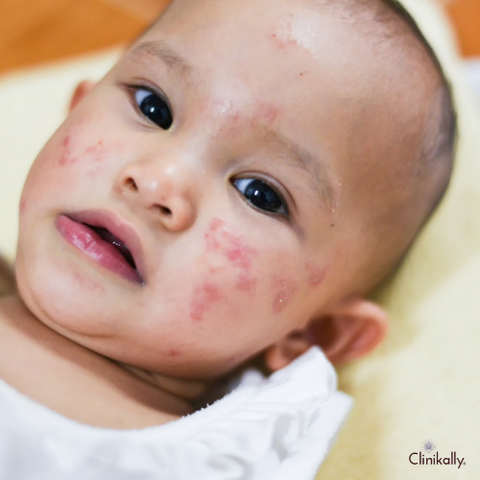
Most cases of baby acne are benign and don't need to be treated by a doctor. However, there are some warning signs to look out for that might point to a problem with your baby's acne:
-
Pus-filled pimples: If your baby has acne that is oozing pus or has pimples that are filled with pus, this may indicate a bacterial infection. Consult your child's paediatrician, who might suggest antibiotics or other therapies.
-
Inflammation that is very severe: If your baby's acne is very bad and is causing a lot of redness and inflammation, this may be a sign of a more serious skin condition, like eczema or a very bad allergic reaction. Your child's paediatrician should be consulted as they might suggest additional exams or therapies.
-
Delayed onset: If your baby's acne doesn't start to show up until well past the six-month mark, this may indicate a hormonal imbalance or another underlying health issue. You should speak with your child's paediatrician, who might suggest blood tests or other diagnostic techniques to ascertain the true cause.
-
Acne that lasts longer than six months: The majority of baby acne cases go away on their own in a few months. When acne in your baby lasts longer than six months, it may be a sign of an underlying medical condition like infantile acne or rosacea. You should speak with your child's paediatrician, who might advise a dermatologist to conduct additional testing.
Skin Sensitivity and Genetic Predisposition
The skin of some babies may be more sensitive than the skin of others, making them more prone to rashes, including baby acne. Sensitive skin can react more easily to irritants, allergens, and changes in the environment, which can lead to inflammation and acne breakouts. Genetics can also play a role in the development of baby acne. Some infants may have a genetic predisposition to acne due to an abundance of sebum or hormone sensitivity. If one or both parents had baby acne as children or teenagers, a child may be more likely to develop it as an adult. While skin sensitivity and genetics may play a role in the emergence of baby acne, it's crucial to remember that the majority of cases are benign and go away on their own in a matter of months. You should seek advice from your paediatrician if you have questions about the skin or acne of your infant. Your paediatrician can advise on the best courses of action for your child's acne and assist you in determining whether it is a serious issue.
Heat Rash and Medication Side Effects
There are two other conditions that can resemble baby acne: heat rash and medication side effects.
-
Heat rash: Sweat gets trapped under the skin as a result of blocked sweat ducts, which is a common condition. Small, red bumps on the skin caused by heat rash may resemble baby acne. However, heat rash frequently affects parts of the body that are prone to perspiring, such as the neck, chest, and groin, in contrast to baby acne, which typically manifests on the face.
-
Medication side effects: Some medications, like corticosteroids, can result in skin eruptions that resemble acne. These eruptions may be a reaction to the medication or a side effect of it. Your paediatrician may advise switching the medication or adjusting the dosage if you believe your baby's acne is a reaction to a medication.
When to Seek Paediatric Consultation
The majority of baby acne cases are benign and don't require medical attention. However, you should seek paediatric advice if you have concerns about your child's acne or if you spot any symptoms of a more serious condition.
Should one of the following occur:
-
If the acne on your baby has pus-filled bumps or is oozing, this might be a sign of a bacterial infection.
-
It's possible that your baby's severe acne, which is also causing a lot of redness and inflammation, is a sign of a more serious skin condition like eczema or a very bad allergic reaction.
-
After six months of age, your baby's acne starts to show up, which may indicate a hormonal imbalance or another underlying medical condition.
-
When acne in your baby lasts longer than six months, it may be a sign of an underlying medical condition like infantile acne or rosacea.
-
Significant discomfort is being brought on by your baby's acne, such as itching or pain.
How to Prevent & Treat Baby Acne
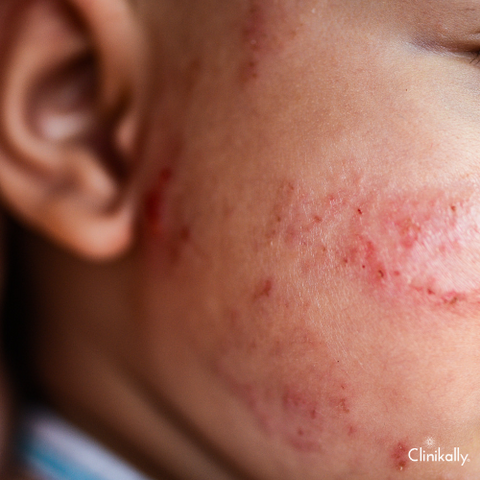
The majority of cases of baby acne do not require medical treatment and will clear up on their own in a few weeks or months. There are, however, steps you can take to treat and prevent baby acne.
-
Keep the area clean: Gently wash your baby's face with warm water and mild, fragrance-free soap. Avoid rubbing your skin or using abrasive soaps or scrubs, as these actions can aggravate acne.
-
Avoid oil-based products: Avoid using oil-based products, including baby oil, on your baby's skin because they can clog pores and contribute to acne breakouts.
-
Don't squeeze or pick at pimples: Refrain from squeezing or picking at your baby's pimples, as this can cause inflammation and scarring.
-
Avoid tight clothing: Wear loose-fitting, breathable clothing that allows the skin to breathe and does not trap moisture against the skin for your baby.
-
Breastfeed: If at all possible, breastfeed your baby as this may help to prevent or lessen the severity of baby acne.
-
Consult your pediatrician: If your child's acne is bothersome or severe, your doctor may suggest a topical medication, such as a mild hydrocortisone cream, to help reduce swelling and redness.
-
Be patient: Most cases of baby acne will go away on their own in a few weeks or months. Be patient and continue to be gentle with your baby's skin in the interim.
Baby Hygiene and Skin Care
Your baby's health and the prevention of skin issues like baby acne depend on proper baby hygiene and skin care. You can keep your baby's skin clean and healthy by following these tips:
-
Bathing: It is advised to bathe infants two to three times per week. Use mild soap or a cleaner made especially for babies along with warm water. Avoid using harsh soaps or scrubs on your skin because they can irritate it.
-
Changing diapers: To prevent diaper rash, change your baby's diaper frequently. Warm water and a soft baby wipe should be used to thoroughly clean the diaper area. Apply a diaper rash cream or ointment to prevent irritation.
-
Moisturizing: To keep your baby's skin supple and hydrated, use a mild, fragrance-free moisturizer. Avoid using products with alcohol or fragrances because they can be harsh on the skin that is already delicate.
-
Clothing: Dress your baby in loose-fitting, breathable clothing made from natural fabrics like cotton. Avoid synthetic materials that can trap moisture against the skin.
-
Sun protection: Keep your baby in the shade, cover up with a hat or umbrella, and use a baby-safe sunscreen with an SPF of 30 or higher to protect their sensitive skin from the sun.
-
Nail care: Trim your baby's nails regularly to prevent scratching, which can lead to infection.
-
Cleaning and sanitizing: To stop the spread of germs, regularly wash and sanitize your baby's toys, bedding, and other items.
Baby Skincare Products and Natural Remedies
When choosing baby skincare products and natural remedies, it's important to use caution and choose gentle, safe alternatives that are suitable for your baby's delicate skin. The following points should be remembered:
-
Avoid using harsh ingredients: Avoid using products that contain strong chemicals or fragrances because they can irritate a baby's skin. Avoiding alcohol, fragrances, and dyes will help you avoid some common irritants.
-
Select gentle cleaners: Use gentle cleaners designed especially for infants. On your baby's skin, stay away from using regular soaps and adult skincare products because they can be too harsh.
-
Moisturize regularly: Use a gentle, fragrance-free moisturizer to keep your baby's skin soft and hydrated. Look for products with all-natural ingredients, such as chamomile or aloe vera.
-
Consider natural remedies: Coconut oil, breast milk, and chamomile tea are some natural treatments that could ease and treat baby acne. However, before using any natural remedies, it's crucial to consult your child's pediatrician.
-
Patch test first: Before using any new skincare products or natural remedies on your baby's skin, it's a good idea to do a patch test first. To check for a reaction, apply a small amount to a small patch of your baby's skin and wait 24 hours.
-
Consult your paediatrician: Consult your paediatrician for advice if you have any questions about your baby's skin or are unsure of which products to use.
Infant Development and Skin Health
Infant development and skin health are inextricably linked. Your baby's skin is its first line of defence against the elements, controlling its body temperature and preventing dehydration. Here are some of the links between infant development and skin health:
-
Nutrition: A balanced diet is necessary for the growth of healthy skin. Essential nutrients and antibodies found in breast milk support your baby's immune system and encourage healthy skin.
-
Immune system: Having a strong immune system is essential for keeping the skin healthy and for preventing infections. As your baby's immune system develops, they become better equipped to fight off infections and other threats to their skin health.
-
Motor skills: The health of your baby's skin can be impacted by their motor skills. For instance, your baby may be more likely to get diaper rash if they spend a lot of time on their back. Encouragement of tummy time can aid in avoiding this.
-
Environment: Your baby's environment has an impact on the health of its skin. Skin irritation and other issues can be brought on by exposure to harsh chemicals, extreme temperatures, and other environmental factors.
-
Hygiene: Keeping your skin healthy requires good hygiene. Skin infections and other problems can be avoided with regular bathing, diaper changes, and other hygiene routines.
Prevent Baby Acne With the Right Steps!
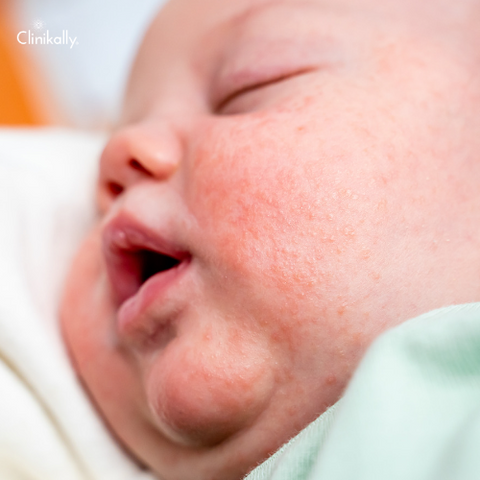
Baby acne is a common ailment that usually manifests in the first few weeks of life and affects many infants. While it can be upsetting for parents, it is usually harmless and will resolve on its own. Baby acne can occasionally be an indication of a deeper issue, such as an infection or allergy, so be aware of any additional symptoms and seek medical attention as needed. By keeping their skin clean and using gentle skincare products, parents can prevent skin irritation in babies and promote healthy skin development. Additionally, a strong immune system, a secure environment, and a healthy diet can all have an impact on an infant's development and skin health.





